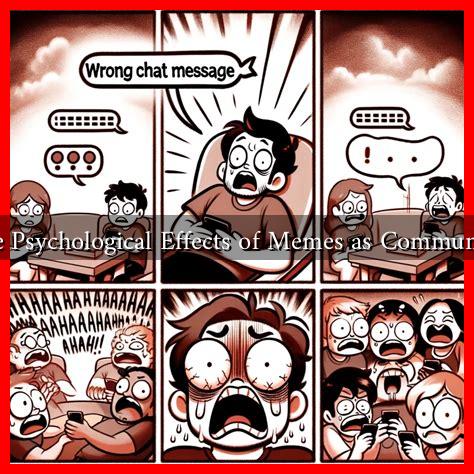-
Table of Contents
What Are the Psychological Effects of Memes as Communicative Tools
In the digital age, memes have emerged as a powerful form of communication, transcending cultural and linguistic barriers. These humorous images, videos, or text snippets often convey complex ideas and emotions in a simple, relatable manner. As a result, memes have become a significant part of online discourse, influencing public opinion, social movements, and even personal relationships. This article explores the psychological effects of memes as communicative tools, examining their impact on cognition, social behavior, and emotional expression.
The Cognitive Impact of Memes
Memes are designed to be easily digestible, often relying on humor and visual elements to convey messages quickly. This simplicity can have profound cognitive effects:
- Information Retention: Research suggests that people are more likely to remember information presented in a humorous or visually engaging format. A study published in the journal Cognitive Science found that humor enhances memory retention, making memes an effective tool for disseminating information.
- Critical Thinking: While memes can simplify complex ideas, they can also encourage critical thinking. By presenting information in a relatable context, memes prompt viewers to analyze and question the underlying messages, fostering a more engaged audience.
- Framing Effects: The way a meme is framed can significantly influence perceptions. For instance, a meme that portrays a political figure in a negative light can shape public opinion, highlighting the power of memes in shaping narratives.
Social Behavior and Memes
Memes play a crucial role in shaping social interactions and behaviors. Their viral nature can create a sense of community and belonging among users:
- In-Group vs. Out-Group Dynamics: Memes often reflect shared experiences or beliefs, fostering a sense of belonging among those who relate to them. This can create in-group dynamics, where individuals feel connected to others who share similar views, while simultaneously alienating those outside the group.
- Social Movements: Memes have been instrumental in mobilizing social movements. For example, the Black Lives Matter movement effectively utilized memes to raise awareness and promote activism, demonstrating how memes can serve as catalysts for social change.
- Online Identity Formation: Users often curate their online personas through the memes they share. This selective sharing can influence how individuals perceive themselves and how they are perceived by others, impacting self-esteem and social identity.
Emotional Expression Through Memes
Memes provide a unique platform for emotional expression, allowing individuals to convey feelings that may be difficult to articulate:
- Humor as Coping Mechanism: Many people use memes to cope with stress, anxiety, or sadness. By sharing humorous content, individuals can find solace in shared experiences, reducing feelings of isolation.
- Empathy and Connection: Memes that resonate emotionally can foster empathy among viewers. For instance, memes addressing mental health issues can create awareness and understanding, encouraging open conversations about topics that are often stigmatized.
- Viral Sadness: Conversely, memes can also spread negative emotions. For example, memes that mock or belittle individuals can perpetuate feelings of inadequacy or sadness, highlighting the dual-edged nature of meme culture.
Case Studies and Statistics
Several studies have explored the psychological effects of memes. A 2020 study published in the journal Frontiers in Psychology found that memes significantly influenced participants’ attitudes toward political issues, demonstrating their power as persuasive tools. Additionally, a survey conducted by the Pew Research Center revealed that 55% of social media users have shared memes related to social or political issues, indicating their widespread impact on public discourse.
Conclusion
Memes have evolved into a multifaceted communicative tool with significant psychological effects. They influence cognition by enhancing information retention and critical thinking, shape social behavior by fostering community and identity, and facilitate emotional expression through humor and empathy. As digital communication continues to evolve, understanding the psychological implications of memes will be crucial for navigating the complexities of online interactions. In a world where memes dominate social media, their power to inform, connect, and influence cannot be underestimated.

